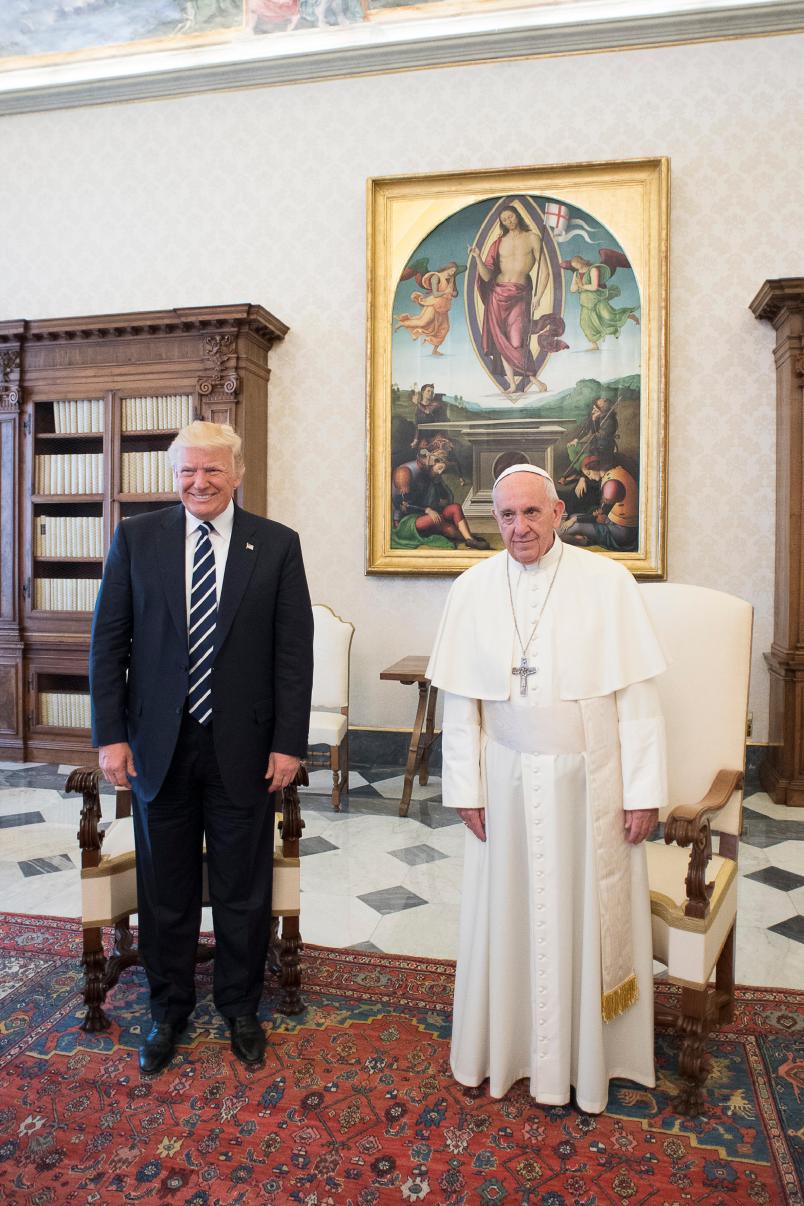WASHINGTON (AP) — When President Donald Trump met Pope Francis this week, the U.S. leader renewed a commitment to fighting global famine and proudly announced a new multimillion-dollar American aid contribution to four African nations in crisis. Left unsaid by the president or the White House: His proposal to slash such funds by more than 40 percent in the next fiscal year.
While the Trump administration’s 2018 spending plan does not eliminate money for emergency food aid, it ends a critical program by consolidating it into a broader account that covers all international disaster assistance. Doing so reduces the amount of money the U.S. dedicates to fighting famine to $1.5 billion next year, from $2.6 billion in 2016. The reduction is likely even steeper compared to 2017, but the administration hasn’t calculated figures for this fiscal year because it doesn’t end until Sept. 30 and more money may be allocated for famine relief before then.
Trump officials say the proposed changes will streamline U.S. aid programs, eliminate redundancies and increase efficiency. Relief organizations fear less U.S. money will mean an increase in famine and hunger-related deaths, particularly in Africa, if Congress approves the budget. Trump’s overall proposal, however, is already prompting significant opposition from Republican and Democratic lawmakers.
Trump’s announcement at the Vatican on Wednesday, which officials said totaled $329 million, went largely unnoticed, tucked into the last paragraph of a brief White House readout of the meeting. And coverage of the president’s papal audience was dominated by atmospherics between two men with widely divergent views on many issues.
Officials familiar with planning for the new assistance said the White House was seeking “a deliverable” to announce after Trump’s discussions with the pope and settled on the additional famine relief for millions in South Sudan, Nigeria, Somalia and Yemen. The officials spoke on condition of anonymity because they were not authorized to speak about the issue publicly.
In the meeting, Trump “renewed the commitment of the United States to fighting global famine,” the White House said. “As he relayed at the Vatican, the United States is proud to announce more than $300 million in anti-famine spending, focused on the crises in Yemen, (South) Sudan, Somalia and Nigeria.”
The U.S. Agency for International Development, which along with the State Department could face a 31 percent budget cut, said the additional money brought total U.S. humanitarian assistance for those four countries to almost $1.2 billion since last October. “The United States is one of the largest donors of humanitarian assistance in all four crises,” it said, extolling the value of U.S. aid.
In what may have been a subtle reminder to the rest of Trump’s administration, the agency’s statement said: “The assistance we provide represents the best of America’s generosity and goodwill, while improving our national security by strengthening relationships with nations and people around the world. We will continue to work with our international and local partners to provide the life-saving aid needed to avert famine and to support surrounding countries that have been impacted by these crises.”
Yet, that support and broader disaster relief assistance would face drastic cuts if the administration gets its way.
The proposed 2018 budget seeks $2.5 billion for international disaster assistance. Of that total, $1.5 billion would be for food aid.
In 2016, the United States provided $2.6 billion in food aid through a combination of money from the disaster assistance fund and Title II of the “Food for Peace” program, which requires most of its money be spent on American food that is then shipped to areas in need. Trump’s budget would eliminate that program, which accounted for $1.7 billion worth of emergency food aid last year, calling it inefficient.
In its statement supporting the change, USAID said moving all famine aid to the disaster assistance account “allows USAID to both support the purchase of commodities in the U.S. and in markets overseas.” The U.S. would end up providing food assistance “more efficiently and in a manner that uses the most appropriate tool for crises.”
Lawmakers and aid group have failed for years trying to overhaul the Food for Peace program. It is fiercely defended by farm-state lawmakers and shipping companies who cite benefits for American industry.
At a budget hearing Wednesday, Alabama Rep. Robert Aderholt told Trump’s agriculture secretary the program “is something we should be proud of.”
Eliminating it, said Aderholt, who heads the House panel controlling Food for Peace’s funding, “runs entirely counter to the idea of buy American, hire American” that Trump has championed.
“I think your comments are essentially irrefutable,” Agriculture Secretary Sonny Perdue conceded.
___
Associated Press writer Mary Clare Jalonick contributed to this report.
Copyright 2017 The Associated Press. All rights reserved. This material may not be published, broadcast, rewritten or redistributed.







The GOP knows exactly what it’s doing in the proposed budget. Trump, however, has so little understanding of the substance of his actual budget that he can contradict it at will at any given moment just to make himself look good. Our embarrassment of our country and its leader is again on full display.
A feature, not a bug, as they say.
But Donald still gets two scoops, right?
Yes. And I gave your comment only one like.
Look. What’s important to this guy is WINNING. After that, to him it doesn’t matter WHAT he says or does.